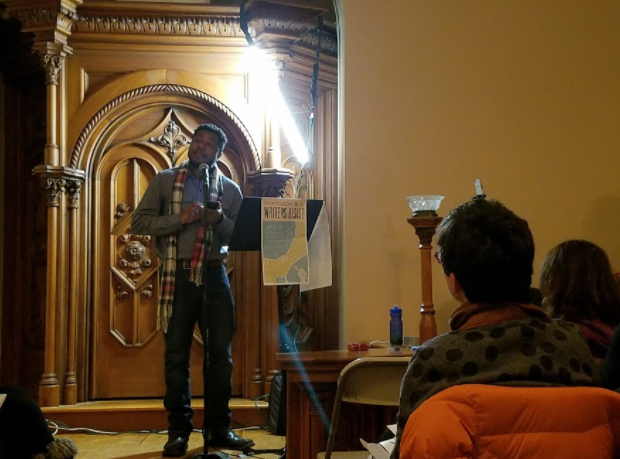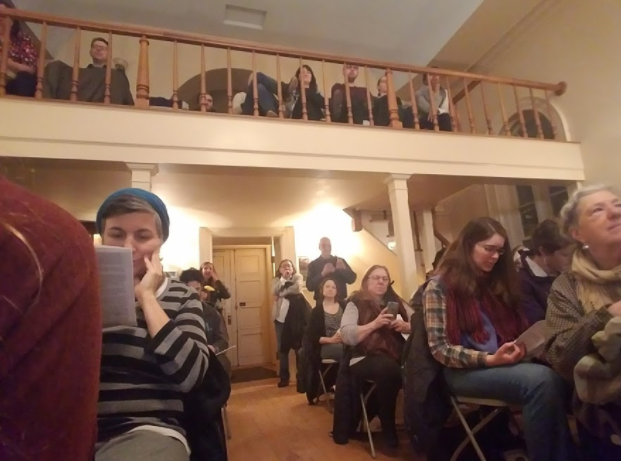






 Derrick Austin reads an original piece of poetry to attendees. (Claire VanValkenburg/Madison Commons)
Derrick Austin reads an original piece of poetry to attendees. (Claire VanValkenburg/Madison Commons)
East Gorham’s Gates of Heaven Synagogue was packed on Martin Luther King Jr.’s birthday with an audience that would hum in quiet agreement to the poignant expressions of poets, novelists and professors as they delivered their work.
The Writers Resist movement aims to encourage writers to speak out for minorities and promote pro-democratic ideals, co-organizer Rita Mae Reese said in an email, and is a national movement created by poet Erin Belieu, the co-founder of VIDA: Women In Literary Arts. Reese worked with Kara Candito, Ron Czerwien and Judith Claire Mitchell to organize Madison’s event.
“We all answered the call and we decided to form a kind of local event, and the response was immense,” Candito said. “Everyone we’ve contacted has been so enthusiastic about participating.”
The event featured readings from 19 local writers with backgrounds in activism, poetry and entrepreneurship. Afterwards, the mic was turned over to audience members who could sign up to read a selection of writing.
Derrick Austin, author of “Trouble the Water,” was a featured writer and read one of his poems. Austin said he felt it was important for him to speak out through poetry.
“As like a black, queer man in America I feel like I have the responsibility and the opportunity to do something like this, especially doing it through a vehicle like poetry,” Austin said. “Which I think is especially important in this moment to like take care and to acknowledge how important the arts are.”
The event aimed to renew a sense of solidarity and confidence in democracy, Reese said in an email. Reese said writers are individuals who have the power to induce change in a community.
 Attendees stood at the rear of the Synagogue to listen to the readers. (Claire VanValkenburg/Madison Commons)
Attendees stood at the rear of the Synagogue to listen to the readers. (Claire VanValkenburg/Madison Commons)
“Freedom of speech is the cornerstone of democracy. If the people can’t speak then we can’t possibly have open government of the people,” Reese said. “[Writers] are really used to crafting stories and shaping language to experience, so they can kind of immediately react when there’s a problem. And I think we have some serious problems facing us right now.”
Organizer Candito hopes more art-centered activism will take place in Madison.
“I think when we come together like this as a community we see the immense possibility in art in poetry and fiction,” Candito said. “We’re hoping that this is the first of many local events that emphasise our ability to enact change as artists in a community.”
|
|
|
Welcome to the Madison Commons, a website designed to provide news and information about all of Madison's neighborhoods and a crossroads for the discussion of community issues. The name comes from the idea of a village commons, a place for news, talk, debate, and some entertainment, too, that's open to everyone.
All rights reserved. Read more about the Madison Commons and its partners.

